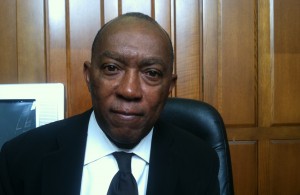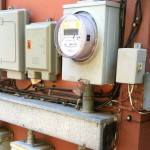Risk of Life Without Air Conditioning Grows for Low Income Texans

Mose Buchele for StateImpact Texas
State Rep. Sylvester Turner helped create the System Benefit Fund. He will now see the fund drawn down.
Over the next three years, low-income Texans will receive approximately $800 million from the state to help pay their summer electric bills. However, on September 1, 2016, that money will run out. As a result, Texans who cannot afford to pay their electric bills are likely to go without air-conditioning during the summer.
The money comes from the System Benefit Fund, which the Texas Legislature created to assist low-income Texans with their electric bills after the state’s electricity markets were deregulated over a decade ago. (In Austin and San Antonio, where electricity markets are still regulated, residents are not eligible to receive this funding.)For years, however, though the state collected fees for the fund from Texas electric ratepayers, it often reduced or withheld the money that was supposed to go to low-income Texans. Keeping the money in the treasury helped state lawmakers certify that the budget was balanced.
During the 2013 regular legislative session, lawmakers ended the collection of fees for the program, but increased the electric bill discount for qualifying low-income households from 16.5 percent to 82 percent. The existing fund will be used to help pay the remaining 18 percent of those households’ electric bills for the month of September 2013, and the period from May to August 2014.
Once the fund is gone, there are concerns about what could happen to elderly and low-income Texans who cannot afford to pay their electricity bills during the hot summer months.
According to a recent feature in National Geographic, hot weather can cause serious health problems for people who are unable to get out of the heat and cool down.
As the weather gets hotter, it becomes more difficult for the human body to shed heat. Normally, heat flows from the human body into the atmosphere, but when temperatures rise above 100 degrees, the body’s natural cooling system reverses, and heat flows from environment into the body. At this point, another cooling mechanism usually kicks in: sweating. But in hot, humid places, like Houston, sweat does not readily evaporate, preventing the human body from dissipating heat and cooling down.
In drier climes, sweat evaporates more easily, but people have to drink enough water to make up for the loss of bodily fluids. (They also have to replace the salt that their bodies have lost.) Without enough water, body heat builds up, because dehydrated people experience decreased blood flow to the skin and the decreased ability to sweat.
Children, the elderly, and ill individuals are not the only people susceptible to heat-related illness. Young, healthy people also succumb to heat-related illnesses, according to the Centers for Disease Control. Once temperatures are in the high 90s or above, the CDC reports that electric fans will not prevent heat-related illness.
State Rep. Sylvester Turner (D-Houston), who helped create the System Benefit Fund in 1999, knows what it is like to live without air-conditioning.
“When it’s hot, you’re not able to study as a kid,” Turner said. “When you’re sleeping, you’re sleeping at night with your head in the window, with the windows open, because you’re hoping for a cool breeze. It affects your health. It affects your ability to study. I’ve lived this. This is not about what somebody else has said to me or what I’ve read.”
At a press conference Thursday, Rep. Turner and state Sen. Rodney Ellis (D-Houston) emphasized that while 85 percent of eligible Texans will be automatically enrolled in the System Benefit Fund program, there are 15 percent that still have to apply in order to be enrolled—which they must do very soon, before August 13, 2013.
Texans whose household income is at or below 125 percent of the federal poverty guideline qualify for the assistance. They can apply online here, or by calling 1-866-454-8387. That poverty guideline equates to a family of four living on an income of $29,000. Customers also qualify if they currently receive Texas Medicaid or the Supplemental Nutrition Assistance Program (SNAP).
For Texans who qualify, the program can significantly change the quality of their lives and health. Recently, Rep. Turner’s office received a call from a senior citizen whose power had been turned off. As the temperature in her house became unbearable, her only recourse was to go outside into the Texas summer heat, where the temperatures were at least lower than in her house. She had a fan on inside, Rep. Turner said, “but it was blowing hot air… She was in her eighties. You can’t expect people to live very long like that. Their quality of life is very poor.” After Rep. Turner’s staff made phone calls and got her power turned back on, the woman’s attitude seemed “much brighter” and more energetic.
“You just saw a tremendous change in her overall disposition,” Rep. Turner told StateImpact Texas. “That’s what this program is all about. It’s about trying to provide added quality of life to families, and especially to seniors, who are doing everything they can just to make it through. Unless people have walked in their shoes, they really don’t understand the full magnitude of what this program can do.”
